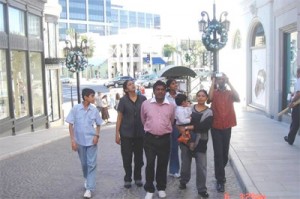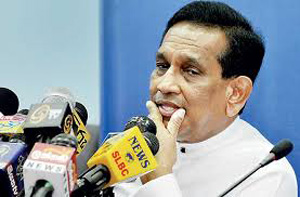Columns
Wijeyadasa must come clean on friendship with arms dealer

STRECH LIMO: Wijeyadasa and wife with Senadipathi's family in Los Angeles
This morning the Justice Minister Wijeyadasa Rajapakshe must ask himself a few simple questions:
Has he as a member of parliament availed himself of any generous hospitality in the past extended to him and his family by the controversial Avant Garde chairman, the arms dealer Senadhipathi whom he has been defending so vigorously in public in recent times as being innocent and devoid of any wrong doing?
And whether, even if he, Wijeyadasa, has not accepted the benefit of any sponsored stay in the United States or elsewhere, his past actions now revealed have irrevocably created in the public mind the indelible impression that he appears to have been influenced and his judgement coloured even by a shade as a result? And whether, even if he is innocent of all the innuendos levelled against him, his close friendship with the controversial Avant Garde boss – now photographically established beyond reasonable doubt -has made his position as the nation’s Minister of Justice no longer tenable?
With Field Marshal Sarath Fonseka presenting photographic evidence showing Wijeyadasa Rajapakshe, his wife and son, living it up in Los Angeles, with former Avant Guard boss arms dealer Nissanka Senadhipathi and his family, the public demand his answer forthwith.
Not that anyone is accusing Wijeyadasa of any wrong doing. Not that anyone is claiming that the holiday was paid for by Senadhipathi. Maybe it was Wijeyadasa who hosted the Avant Guard chairman, his wife and baby to travel around in stretch limos in California nine years ago when Wijeyadasa was a national list member of parliament and a Minister of State in Mahinda Rajapaksa’s government or paid the 75 dollar tickets to enter Disney Land and see Mickey Mouse goofing around. That is not the issue.

CALIFORNIAN SUNSHINE: Posing for the family album, Wijeyadasa and family with Senadipathi's family
 What is important is whether his past close family ties – so close as to enjoy family holidays together in affluent Californian climes – with the arms dealer he is now defending as Justice Minister of the government, has deprived him the ability to claim that high degree of objectivity his exalted office inexorably demands?
What is important is whether his past close family ties – so close as to enjoy family holidays together in affluent Californian climes – with the arms dealer he is now defending as Justice Minister of the government, has deprived him the ability to claim that high degree of objectivity his exalted office inexorably demands?
While Wijeyadasa has spiritedly defended the roles of all those involved in the Avant Garde affair including its Chairman Nissanka Senadhipathi both in Parliament and elsewhere and even taken the credit for preventing the arrest of Gotabhaya Rajapaksa during the ongoing Avant Garde investigations, he has also made no mention of his personal link to Senadhipathi and his family.
But as these photographs clearly show, his relationship with the arms dealer extends far beyond a passing acquaintanceship. As these posed photos for candid camera reveal, it is one that appears to be firmly embedded in a close-knit friendship encompassing the wives and children of both men.
When former Law and Order Minister Tilak Marapana rose to speak in the Avant Garde debate in parliament on 4th November he was frank enough to admit at the outset of his speech defending Senadhipathi, that the arms dealer was his client. Shouldn’t Wijeyadasa now confess that Senadhipathi is his friend?
In the light of Sarath Fonseka’s photographic expose shouldn’t Wijeyadasa Rajapakshe ask himself the final question: Whether his silence on his friendship with Senadhipathi while defending in Parliament the latter’s controversial Avant Garde role as being above board has compromised his own position as the Minister of Justice and is tantamount to conduct unbecoming?
| Why compulsory AIDS test shows negative for Rajitha Lanka’s answer to AIDS threat, a world’s firstLiberal educationalists who had long insisted that Lanka’s young should be taught about the birds and the bees and campaigned for sex education to be included in a meaningful manner in the school curriculum would never have dreamt that things would come to such a permissive pass in so short a time since sex was introduced to the classroom to be studied as a subject.  RAJITHA: Testing time No doubt they would have been shocked to learn that today’s students, having long graduated from the theory part, had proceeded to do the practicals with so much zest and vigour that nothing short of compulsory HIV testing on the randy bucks and frisky doe would prevent a deadly AIDS epidemic from blowing up in Lanka. The question is, however, whether the crisis has been blown out of all proportion. The opportunity to assault another windmill of life presented itself to him in Parliament when MP Dulles Allahperuma asked him as to the state of AIDS in the country. Armed to the teeth not only with the facts and figures but with the solution, the former dentist Dr Senaratne rose to his feet to spell out the shocking statistics. There were 2,265 HIV infected persons in the country, he declared. Out of that figure, there were 13 children in the 15-19 year age group. These were the children who would presumably be in the O’ level and A’ level forms. Sex education would be included in the school curriculum and a pass in the Health subject under which it came would be compulsory to enter the A’ level classes. Furthermore, all A’ level students, university students and all sports club members would be compulsorily tested for AIDS. For he or his advisers have totally failed to take into account the enormous costs it will entail, the serious social issues it will create and the spurious benefits it will achieve. True, AIDS is a deadly disease and all necessary precautions should be taken to avert a crisis from turning into a catastrophe but is compulsory testing the answer? Consider first the costs involved. At present there are over 300,000 A’ level students and over 100,000 University undergrads, totalling approximately 400,000 students to be queued en masse for mandatory AIDS testing each year. Assuming conservatively that the cost of an AIDS test to be Rs 1000 each, this would mean an outlay of Rs 400 million. Do 13 cases out of a 300,000 A’ level student population or 0.004 percent of the student group justify such an alarmist response which demands a whole scale by force AIDS testing program that would cost over Rs. 400 million to implement? The money for this – and, mind you, this is a very conservative estimate – will have to come from the meagre budget allocated to the free health service which is already hard pressed. If it is said that this will be funded free by concerned western nations, wise up to the fact that everything comes with a price tag, hidden though it maybe. What Lanka receives free to one hand will have to be paid in kind from the other hand at some point in time. Secondly does this country have the required lab facilities and equipment to handle over 400,000 AIDS tests within a very short time frame, perhaps less than a month, given that all students will face a common date to start the A’ level classes or enter campus? Buildings will have to set up in the provinces or even districts, modern laboratories will have to be installed in each and every one of them. Or is the Health Ministry to ask the students from all over the country to make a pilgrimage to the capital every year to get their AIDS tests done? Thirdly, does this country have sufficient trained and qualified lab scientists to handle the workload? Extra nurses will have be drafted to take the blood samples, scientists to conduct the actual testing, another cadre to enter the data into computers and management outfits to administer the operations. All this will require massive capital expenditure on buildings, lab equipment and other paraphernalia and staff training. Such an infrastructure will have to be in place before the project to test 400,000 students can begin. What if the rest of Lanka’s 20 million populace feel left out and demand free AIDS testing too on the basis of the constitutionally guaranteed right to equality? So much for the financial costs. What of the unseen dangers. Today Government hospitals find it hard to come up with accurate results even for a simple full blood report not to mention the inordinate delay patients face in getting their reports. These two factors force even those in the lower income groups to have their tests done at private clinics at exorbitant costs. Will not the demand for over 400,000 AIDS tests to be done in a month – or even 1000 tests per day every day for one year to total 400,000 students – significantly increase the risk of error? Even the most sophisticated and efficient AIDS testing machine, like the ones that test DNA, depend on the hand that feeds it. As scientists have warned polluted blood samples will give wrong results. There is also the risk of the blood samples getting mixed, due to various reasons including wrong labelling of the sample. Whose blood is it will become a perennial problem as fallible hands mix up blood samples and possibly end up giving the wrong report to AIDS free students? These are not mere full blood reports giving the wrong red blood cell count to students but certificates that will, if wrongly identified as positive for AIDS, condemn a young girl or boy to lifelong damnation. And will the system have any confidentiality safeguards? Do we have the necessary checks and balances, the right to privacy laws and the penalties for breaches of confidentiality in place? Like Jews were forcibly lined up to enter Auschwitz death camps, will it be a gross violation of human rights to subject a certain class of people – in this case A’ level and university students – to have their blood extracted for the purposes of determing whether they are guilty or innocent of having AIDS. It should be noted that testing and treatment are inextricably linked and access to treatment and medical care is an vital to encourage tests to be taken. And as a reflection of a humane society represented by a sympathetic government to the plight of those struck down with AIDS due to promiscuity, this country has only one AIDS ward to grant relief to those terminally ill with this deadly disease: the ward in the IDH at Angoda. Finally, even if all these objections as to costs and social consequences are considered surmountable and it is determined that the exercise should be vigorously pursued at all costs, will not the final result of compulsory AIDS tests for students lead but to a dead-end when it’s supposed benefits are discovered to be specious. For the entire exercise is not to cure a person for AIDS has no cure, not to immunise a person for AIDS has no vaccine but simply to identify a person as an AIDS carrier and add another statistic to the logbook. And how will that help in the great battle against AIDS? Even if the great majority of the student population are certified as being AIDS free will that be a ground for complacency and give the Minister of Health a good night’s sleep? For even if a person is certified as not being infected with AIDS today, there is no guarantee he will not be infected tomorrow. Nay, even if he is declared AIDS free today, he may still have AIDS, having got infected with the virus after having unprotected sex between the time he gave blood and the time he received his ‘negative’ report. Thus an all clear AIDS test is not worth the paper it is written on unless every boy is braced with a genital guard and every girl is clamped with a chastity belt and the key thrown away after the blood sample is given. No need to make Lanka the laughing stock of the world by becoming the first country to have compulsory AIDS tests for its student population as the means of preventing an AIDS explosion. It might also give the wrong idea to the world that this country, like those in the African continent, is experiencing a serious epidemic which demands such drastic measures. In the sub Saharan Africa in 2013, an estimated 24.7 million people were living with HIV, accounting for 71% of the global total. In Lanka, according to the statistics the minister disclosed on Monday, there are only 2265 Lankans infected with AIDS: Just 0.6 percent of the total population. All that will be achieved is to make a mountain out of a molehill and persuade the tourists to give the thumbs down to Lanka as a holiday destination. Far better for the Health Minister Dr Rajitha Senaratne to expend his energies making the children of Lanka more aware of the dangers of unprotected sex and to encourage the wider use of condoms which have been held to be an effective safeguard against contracting not only AIDS but also other venereal diseases. The money saved on shelving blanket AIDS testing should be spent on conducting special awareness programmes and subsidising condoms and to have it easily available at any corner shop to anyone no matter the age. The subject of sex should be discussed in the open. Not under the bed sheets in the furtive cover of darkness. | |
| All’s well for Salman that ends well for Khan  SALMAN: Bollywood hero Seven months ago Mumbai sessions court judge D.W. Deshpande had held the actor to be the driver of the vehicle which had swerved off the road and run over and killed a man sleeping on the pavement and injured 4 people. Salman Khan had claimed that it was his driver at the wheel – the driver died before the case was heard — and not him. But Judge Deshpande, finding him guilty of culpable homicide, had ruled, “I hold that you were driving the vehicle. You were intoxicated.” Such was the contempt the film star had shown toward the session court that it was only when Judge Deshpande had insisted Salman Khan must be present in person before the judgment was read out, that the actor had rushed to court. He was found guilty on all charges including failure to report the accident. His jail sentence was suspended by the Bombay High Court until his appeal was heard. And on Thursday the Bombay High Court held that the prosecution has failed to establish the charges beyond reasonable doubt. The court said the victim had died “as a vehicle ran over him when he was sleeping on the pavement.” Salman was acquitted and walked a free man out of the courthouse. |


Leave a Reply
Post Comment